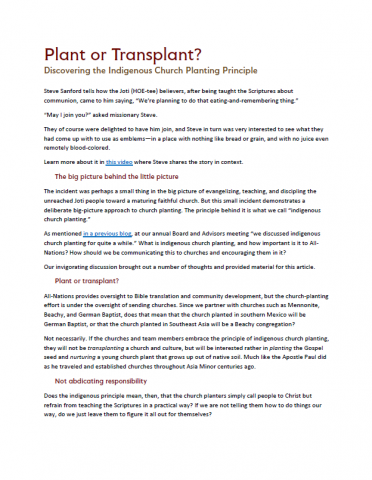Discovering the Indigenous Church Planting Principle
Steve Sanford tells how the Joti (HOE-tee) believers, after being taught the Scriptures about communion, came to him saying, “We’re planning to do that eating-and-remembering thing.”
“May I join you?” asked missionary Steve.
They of course were delighted to have him join, and Steve in turn was very interested to see what they had come up with to use as emblems—in a place with nothing like bread or grain, and with no juice even remotely blood-colored.
Learn more about it in this video where Steve shares the story in context.
The big picture behind the little picture
The incident was perhaps a small thing in the big picture of evangelizing, teaching, and discipling the unreached Joti people toward a maturing faithful church. But this small incident demonstrates a deliberate big-picture approach to church planting. The principle behind it is what we call “indigenous church planting.”
As mentioned in a previous blog, at our annual Board and Advisors meeting “we discussed indigenous church planting for quite a while.” What is indigenous church planting, and how important is it to All-Nations? How should we be communicating this to churches and encouraging them in it?
Our invigorating discussion brought out a number of thoughts and provided material for this article.
Plant or transplant?
All-Nations provides oversight to Bible translation and community development, but the church-planting effort is under the oversight of sending churches. Since we partner with churches such as Mennonite, Beachy, and German Baptist, does that mean that the church planted in southern Mexico will be German Baptist, or that the church planted in Southeast Asia will be a Beachy congregation?
Not necessarily. If the churches and team members embrace the principle of indigenous church planting, they will not be transplanting a church and culture, but will be interested rather in planting the Gospel seed and nurturing a young church plant that grows up out of native soil. Much like the Apostle Paul did as he traveled and established churches throughout Asia Minor centuries ago.
Not abdicating responsibility
Does the indigenous principle mean, then, that the church planters simply call people to Christ but refrain from teaching the Scriptures in a practical way? If we are not telling them how to do things our way, do we just leave them to figure it all out for themselves?
Not at all. Our commitment to Jesus’ final command cannot overlook the part where He said, “teaching them to observe all things whatsoever I have commanded you.” Teaching the Scriptures is one of the team’s solemn responsibilities. So from the Scriptures and by their lives, the team will show what it means to follow Jesus and do God’s will in practical ways. Here is just a sampling of some of these things that must be taught.
- Redemptive discipline in the local church
- Love for enemies and returning good for evil
- Separation from politics, patriotism, and war
- Submitting to one another in the brotherhood
- Marriage as one man and one woman for life
- God’s headship order and the woman’s veiling
The communion example
We see communion both exemplified and commanded in Scripture, and as such it must be taught and carried out. But even as conservative Anabaptist churches, we have varying traditions about how often communion is shared, preparation leading up to the service, what the emblems are made of, and how formal the occasion is.
In the case of the Joti, the church planters felt that these details of application were the local church’s responsibility. But this didn’t happen in a vacuum. The team had already faithfully taught through the translated Scriptures about communion. The Joti believers were not left to their own devices in this matter.
It wasn’t long after this incident that all foreign missionaries were forced out of the country, and the young church had to press forward without them. In these circumstances, the wisdom of the church-planting team in not training the church to depend on the foreigners for directions, methods, and supplies became more quickly evident. The Joti believers had developed their relationship with God, and understood that their direction comes from Him through His Word and by His Spirit. Furthermore, the sudden inaccessibility of outside resources did not halt the function of the church.
In the pilgrim church tradition
Conservative Anabaptist churches identify with a long history of pilgrim church movements. A foundational concept in the narrative and teaching of Scripture is the people of God as a holy community of faith. Not only a family with brotherly feeling, but a truly committed and disciplined brotherhood. A culture set apart within its context, but more than that, a people separated unto God.
The church-planting team is responsible to teach this foundational concept from Scripture and demonstrate it in daily life and discipleship. Faithfully addressing sins and redemptively dealing with transgressors are part of the outworking of this concept, practices that Jesus expects of every church. Another important part is mutual and voluntary accountability as brothers and sisters apply Scripture and follow Jesus in daily life.
So even though the young church may not be Mennonite, Beachy, or German Baptist, they will be guided to the pilgrim church tradition as a holy church, a disciplined brotherhood, a set-apart people.
Concluding ideals
During our intense two-hour discussion as directors and advisors of All-Nations, several ideals came through:
- We draw from the experience of Anabaptist and other church-planting efforts past and present.
- We continue to promote the indigenous church planting principle.
- We encourage and equip sending churches for this vision.
Concretely, a planned church-planting course will be one step in incorporating all three of those ideals.
Pray for All-Nations, the partnering churches, and teams on the field, as we learn together what it means to labor with God in establishing indigenous churches.
—Aaron Crider

